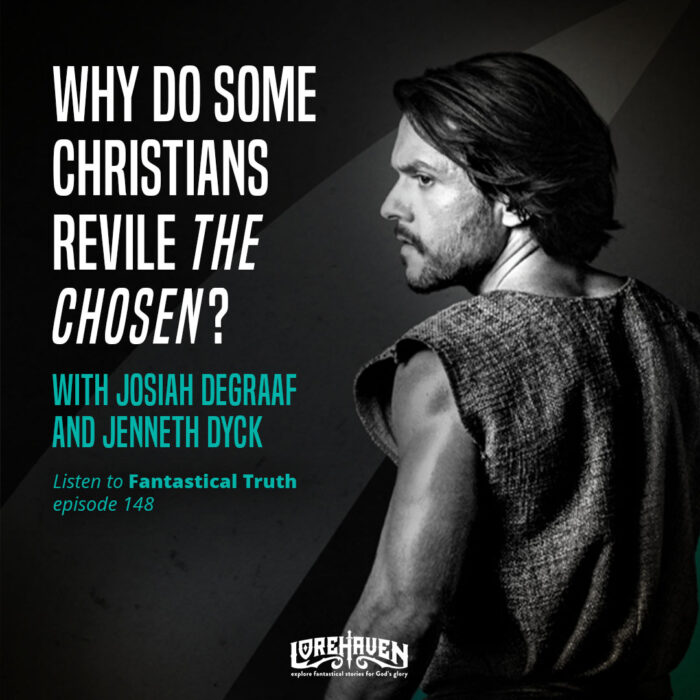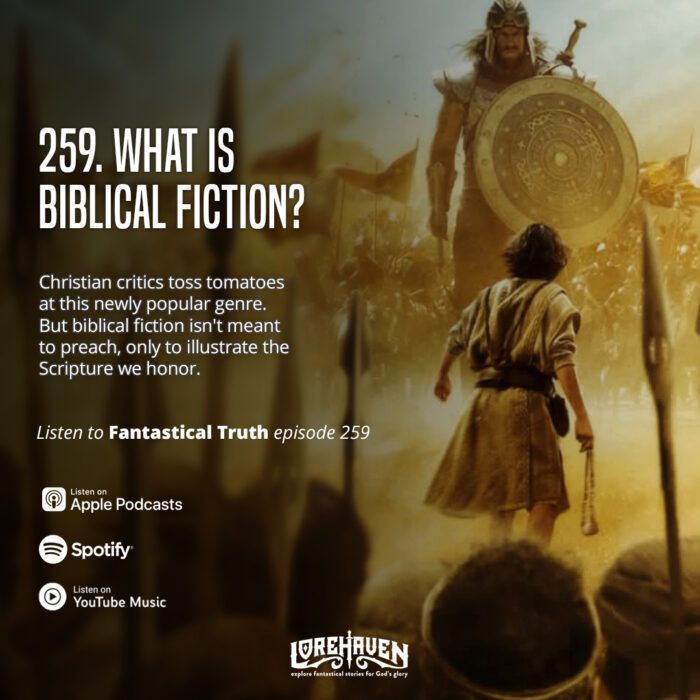259. What is Biblical Fiction?
Podcast: Play in new window | Download (Duration: 1:12:06 — 67.3MB) | Embed
Guess what’s big at the box office and the streaming-service menu, boys? It’s biblical fiction! From the giant-smash hit House of David on Amazon Prime, to The Chosen and its planned Bibleverse, to the new King of Kings animated Jesus movie and even more adaptations from Old and New Testaments, these creations are winning millions of fans but also some evangelical enemies. Few of these seem interested in asking: what is biblical fiction?
Mission update
- Lorehaven action item: Captive last week, Curse of Silence this week
- Subscribe free to get updates and join the Lorehaven Guild
Episode sponsors
- Enclave Publishing: Fathoms by Lisa T. Bergren
- Realm Makers Expo 2025
- Johanna Frank, author of Here Lyeth
- Inheritance by J. A. Webb
 Quotes and notes
Quotes and notes
- Stephen’s series of Lorehaven articles: Discerning Biblical Fiction
- Yes, Dallas Jenkins is Launching the Bible Cinematic Universe
- Christian-Made Stories Got Even Better in 2024
- ‘Gabriel and the Guardians’ Echoes a Golden Era of Saturday Morning Cartoons
- Amazon’s ‘House of David’ Anoints an Intriguing Biblical Epic
- Fantastical Truth episode 148. Why Do Some Christians Revile ‘The Chosen’? | with Josiah DeGraaf and Jenneth Dyck
- Fantastical Truth episode 237. How Has ‘The Chosen’ Become The World’s Top Christian-Made Fandom? | with Ryan Swanson
- Two Christians Made a Show about Jews. It’s Phenomenal, Batya Ungar-Sargon at The Free Press, March 23, 2025
What do we mean by “biblical fiction”?
To understand the label of biblical fiction, let’s define it briefly and carefully.
Let’s start by accepting what biblical fiction is not meant to be.
- It’s not a replacement for Scripture.
- It’s not a sermon or textbook about Scripture.
- It’s not an exact, verse-by-verse re-enactment of Scripture.
- It’s not only focused on historical figures like Jesus, Mary, or Paul.
Instead, let’s understand and accept what biblical fiction is meant to be.
- It is set in ancient times as described by the Bible.
- It often involves historical people that Scripture describes.
- It often explores plotlines and specific events we read in Scripture.
- It usually adds situations, people, or events we don’t read in Scripture
Based on these points, let’s build a working description of biblical fiction:
Biblical fiction is set in biblical times and often involves real-world people, plotlines, and events we read about in the Scripture, while sometimes adding people, plotlines, events, and settings that are not in Scripture.
Let’s accept the story “rules” for biblical fiction.
Viewers (and readers, etc.) should recognize this definition of what biblical fiction is. Then we must adjust our expectations. That’s just part of good interpretation practice, whether we read the Bible or engage with any person’s creative work.1
1. Biblical fiction does not instruct in the Bible.
- This confusion arises when Christians only have one category for “big popular thing that aims to say something about the Biblical account”
- That “big popular thing” category many have is simply this: preacher.
- Many have little interest in other ways that we share the Scripture.
- But most already know we have songs, kids’ books, even summaries.
- Every single person who complains about biblical fiction is already assuming (not preaching) certain ideas they think are from Scripture.
- That’s half the argument: preaching is great, but it’s not everything.
- Stephen compares preaching/teaching to instruction, as the Bible says:
- The book of Proverbs urges instruction not just by teaching Bible in church, but at home. “The fear of the LORD is the beginning of knowledge; fools despise wisdom and instruction.” (Proverbs 1:7)
- “Whatever was written in former days was written for our instruction, that through endurance and through the encouragement of the Scriptures we might have hope.” (Romans 15:4)
- “He [the church overseer] must hold firm to the trustworthy word as taught, so that he may be able to give instruction in sound doctrine and also to rebuke those who contradict it.” (Titus 1:9)
- For instance, The Chosen presents many of Jesus’s miracles and full-length sermons (and the occasional parables), but not to teach us.
- Instead, these events are teaching the characters in the story itself.
- That’s why a show, literally about the most famous Preacher Who ever lived, is not itself preachy. Its writers are thinking about their audience, but the audience sees people, not sermons. Any sermons in the show are meant first for the characters themselves, who may resemble viewers.
- (By the way, authors: this is how you can handle sermons in fiction! They will not solve everything for our heroes, but only add more challenge.)

Joseph Fiennes portrays Roman tribune Clavius, an extra-biblical but not unbiblical character, in the biblical fiction drama Risen (2016).
2. Biblical fiction does illustrate the Bible.
- However, biblical fiction is different, because this illustrates the Bible.
- This is more like the pictures we “see” as we read biblical narrative.
- Some have denied to me that they see these pictures. Is this true?
- Even if they’re right, they would need to admit their neighbors “see” (imagine) these pictures, and be prepared to call them sin. We doubt they’ll go that far, that is, if they truly believe in Scripture’s sufficiency.
- We argue the narratives want you to imagine these events for real.
- We “dare” you to read the accounts describing Christ’s resurrection appearances, or a text like Revelation 19:11-16, and not ask questions like, “What must that have been like to be there? To see Him in person?”
- That’s at the individual level. Now imagine trying to teach a child.
- What would you do? Insist on the full text every time? Or sermons?
- No, you would use picture books. Or summarize the stories. Or even have full-length translations that recast the Scripture in simpler words.
- Or, for older audiences, you might dive deeper and find complications.
- For instance, House of David illustrates one of the most dramatic and even violent eras of Scripture, the reign of King Saul, his divinely appointed collapse into madness and the rise of his replacement.
- Often like The Chosen, its writers ask “what if” questions about character motives. Saul is clearer from Scripture. What about Abner, or Jesse?
- If the authors seek to honor Scripture, the key themes will be preserved.
- They are not contradicting Scripture, but fleshing it out with speculation.
- By the way, some of the best Bible teachers will do that during their sermons. Dallas Jenkins once said he got the idea of Jesus’s choice of Scripture (from Luke 4:14-30) from a sermon by John MacArthur.
- That means our commentaries just as easily inspire fiction illustration.
 3. Biblical fiction gets many (jealous?) critics.
3. Biblical fiction gets many (jealous?) critics.
- We’ve already responded to some criticisms, so here we’ll just sum up.
- Stephen has this hot take: that a lot of the criticism of biblical fiction is just sour grapes from folks who would prefer the crowds follow them.
- Frankly, The Chosen, House of David, et. al. can go places sermons can’t.
- But that is the purpose of Christian-made art, to break down barriers.
- Pastors, apologists, and others: artists need you to uphold barriers!
- At times, however, it doesn’t seem fair to be the “bad cop” doctrinaire.
- But it’s wrong, even sinful, to assume the “good cop” artists are corrupt.
- Jenkins is a faithful Christian. So is Jon Erwin, creator of House of David.
- Of course they have nonbelievers working for them. So do all Christians.
- Now I’m seeking a very early strain of criticism from non-preachers.
- Some other genre creators envy all this attention to biblical fiction.
- Why are they getting all the money? The eyeballs? The attention?
- Even in professional ministry, Paul warns against this kind of response (Philippians 1:15-18). He says that to some extent, he can rejoice even if some people really “preach Christ from envy and rivalry” or for profit.
- Stephen concedes that some fandom enthusiasm for a biblical fiction show (like The Chosen can feel a little much). So would its creators!
- But for creative types, isn’t that what we want? Success for our favorite Christian-made stories in genres like fantasy and science fiction? Well, that would logically entail some of the inevitable fandom craziness.
- Biblical fiction’s rousing success will lift all “boats” in Christian-made art.
- Similarly, Stephen recently found himself in a contest with a bunch of Christian romantic authors. “I’m just jazzed to be on the show, man!”
- Rejoice, and do not envy, the wins of your biblical fiction-artist brothers.
- After all, many of them would love to give similar boost to the fantasy and science fiction tales they also love, because many of them are nerds!
Com station
Top question for listeners
- How do you “illustrate” the Bible as you’re hearing or reading it?
Many listeners do not like the Aslan ladywashing rumors:
@elizabethdmarie: No touching of the historical artifacts!! I was appalled Netflix was going to do anything in the first place and I’m still not happy
@mrs.carter_theauthor: If fans got sonic redesigned, we’ve gotta get this disgusting concept out 😑😑😑😑😑
@evrmrpub: It is like Netflix is going out of their way to ruin things.
Next on Fantastical Truth
We’re still in a Resurrection Sunday mood. So why not consider a big biblical idea. It’s so important that all stories reflect this—the big idea that the Law of God should lead us to the grace of God. But how many stories get these concepts out of balance? When might fantastical tales swerve too far toward “law,” and into legalism, or too far toward “grace,” and into cheap grace?
- Adapted from Stephen’s article Behold the Fantastic Purposes of ‘The Chosen’ and Other Great Biblical Fiction, Lorehaven, May 3, 2021. ↩































Tellingly, I haven’t seen anyone on social media say they weren’t going to see a new Narnia movie before and are now going to because of the Meryl Streep thing. All I see are people who were interested before and now not interested or people who were already going to see it that are still going to see it (though often in a spirit of resignation and with reduced expectations.) I cynically suspect, given the director’ socio-cultural milieu, that she likes Narnia but doesn’t want to make a movie that conservative Christians can enjoy. I know that sounds paranoid, but I sure can’t see any artistic or commercial reason for flipping Aslan’s gender.
On a more cheerful note, my favorite piece of biblical fiction is probably The Man Born to be King by Dorothy L. Sayers. She has Jesus say, “The old Law said: ‘Revenge must be kept within limits: an eye for an eye and a tooth for a tooth and no more.’ But I say: ‘Take no revenge at all. If a man hits you once, let him hit you again if he feels like it…'” The part about keeping revenge within limits isn’t in the Bible and I’d never approve of a translator adding it but I’m grateful to Sayers for writing that because it made me realize something. We think of “an eye for an eye” being a really harsh, unforgiving concept but it wasn’t necessarily seen that way originally. It was about making sure justice was still served while keeping avengers in check. “An eye for an eye” as opposed to “two eyes for one.” This interpretation made it fit in better with the rest of that sermon in which Jesus takes demanding but reasonable sounding laws and updates them to be even more rigorous.
I recall being impressed that The Chosen included Jesus’s line about the poor always being with us. In fiction, that’s usually something evil Christians say to justify unconcern for poor people. I don’t even know how many non-Christians remember it was Jesus who said it.